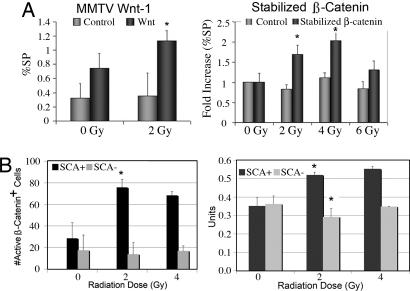Fig. 4.
Clinically relevant doses of radiation led to an increased percentage of SP cells in primary mouse MECs isolated from mice with a gain-of-function, conditionally stabilized β-catenin allele and from Wnt-1 transgenic mice compared with in control cells. (A) MECs from Wnt-1 transgenic mice at 16 weeks of age and wild-type mice of the same background were stained with Hoechst 33342, and the %SP was analyzed by using flow cytometry as described. ∗, P = 0.08 for 0 Gy Wnt vs. 2 Gy Wnt, P = 0.001 for 0 Gy wild type vs. Wnt, and P = 0.04 for 2 Gy wild type vs. Wnt by two-tailed t test. MECs from mice treated with AdCre recombinase to generate stabilized β-catenin or an AdLacZ control vector were stained with Hoechst 33342, and the %SP was analyzed by using flow cytometry as described (P < 0.05 for 0 Gy vs. 2 Gy, and P < 0.05 for 0 Gy vs. 4 Gy). Radiation selectively activated β-catenin and survivin in Sca1+ cells. (B) Quantitative assessment of activated β-catenin signaling was assessed by flow cytometry after staining for Sca1 and unphosphorylated β-catenin. Real-time PCR for survivin expression was performed 24 h after irradiation in Sca1+ and Sca1− cells.

